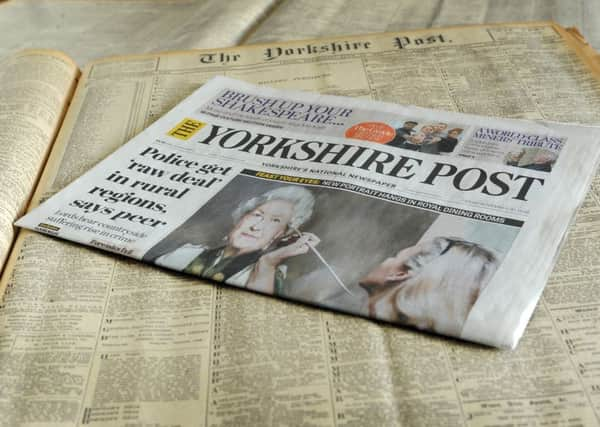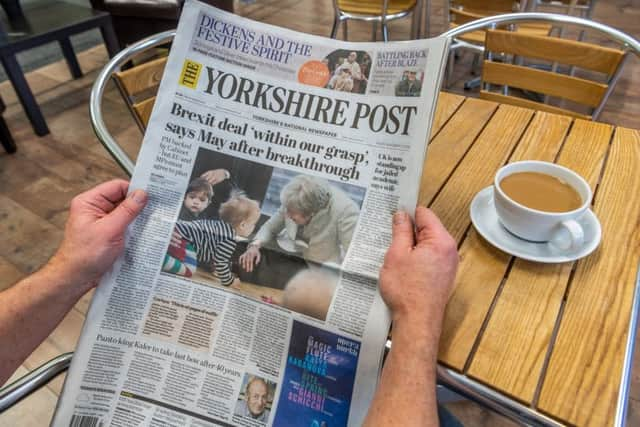Andrew Vine: The unwritten promise behind the printed word '“ the importance of newspapers like The Yorkshire Post


It’s a promise to act as our region’s eyes and ears, to speak up for its interests, to dig out facts that you have a right to know, irrespective of how uncomfortable they make those attempting to shield them, to applaud those worthy of praise, to campaign on your behalf, to cover every aspect of life in Yorkshire, whether serious or whimsical, with care and flair.
Advertisement
Hide AdAdvertisement
Hide AdIf that seems a very heavy load to bear for so fragile and commonplace an item as a newspaper, well, that’s the miracle of them. That’s what they do, day in and day out, year in year out, in the case of The Yorkshire Post for more than 250 years and counting.


The promise that regional and local newspapers all over the country make each time they are published, whether daily or weekly, is too easily overlooked, or taken so much for granted that it is never thought about.
But once in a while, it’s worth a gentle reminder that honesty, reliability and trustworthiness are virtues to be prized in a world gone dishonest, shifty or swivel-eyed.
Go on the internet and fake news overwhelms, with single-issue obsessives spreading crazed drivel or vicious bile insisting it’s gospel truth, online counterparts of saloon-bar bores who preface their nonsense with “Stands to reason that…” or “It’s a well-known fact...”
Advertisement
Hide AdAdvertisement
Hide AdYou won’t find any of that here, or in other newspapers, thank goodness. You will find opinion, sometimes provocative, but never masquerading as fact. If it’s somebody’s opinion, that will be made clear. That’s the difference.
An unwritten contract exists between readers and newspapers – and their associated websites. It’s that you, the reader, can trust the stories on the pages to be fair, accurate and honest.
In return, buying the paper supports the business model which enables it to be published. The other aspect of the contract, and the promise that goes with it, is that papers pledge to do the best by their readers.
Campaigning on their behalf is central to that. When newspapers across the North, including this one, joined forces earlier this year to vent a roar of outrage at the chaos on the railways and demand action, it shook the Government because of what it represented.
Advertisement
Hide AdAdvertisement
Hide AdThis wasn’t just an alliance of publications speaking up. It was millions, across Yorkshire and the rest of the North, expressing their frustration and anger. The newspapers gave them a voice they did not have individually – or even collectively if entire platforms full of stranded passengers had got together to protest – that was loud enough to be heard.
That’s what made the Government sit up and listen. Out of the blue, the silent majority had spoken and said with unmistakeable firmness that it wanted something done.
It put pressure on the Government and the Transport Secretary, Chris Grayling, to get their respective fingers out because there’s a solidity about the printed word that can’t be ignored.
An MP wanting to make a point in Parliament won’t get very far by holding up a print-out of an email or web page. If they hold up a front page that tells a story in words and pictures, the House sits up and takes notice.
Advertisement
Hide AdAdvertisement
Hide AdChronicling the number of times The Yorkshire Post has spoken up for the people of our county over the course of its long history would fill a month’s worth of editions, maybe more. So would the number of times it has broken exclusive stories that made those in power, whether nationally or regionally, squirm because they shone a light into corners that had deliberately been kept murky.
Digging the stories out is doing the best by readers too, but so is reflecting the nature of the area served by a newspaper and the concerns of its people, in the case of this one, the biggest county in the country.
In a real sense, papers belong to their readers. They are guided by their concerns, asking themselves every day what matters most to them. Papers highlight those matters, finding out, analysing, explaining and peeling away layers of complexity or concealment to get at the essential truth.
And then they give readers a forum in which to debate. Letters pages are full of opposing views about any given subject, whether it be trivial or a matter of great weight, such as Brexit or regional devolution.
Advertisement
Hide AdAdvertisement
Hide AdIn doing so, papers are part of the fabric of communities. There is nothing to rival them as a means for people to have their say, hear the views of others and find out what is happening in their city, town or village.
That is because papers understand their areas. They are not some distant entity that parachutes people in who then leave, but part of the community, produced within it by people who belong to it.
Newspapers have their travails, whether they be financial challenges or unfair competition from social networks which steal material, disseminate it, and give nothing in return whilst evading the proper scrutiny under which the Press operates.
But they are not cowed by challenges. They get on with the business of serving their areas every day and every week, not just because there’s a job to be done, but because there’s a duty to be discharged.
Advertisement
Hide AdAdvertisement
Hide AdIt is the duty to play a central part in regions and communities large and small, revealing, reporting, analysing, commenting, championing and celebrating every issue from politics to sport. In doing so, they enrich the life of the areas to which they belong.
A public service? Yes, actually, and one which would be sorely missed if it were ever lost. But that isn’t going to happen, thankfully.
Papers might be fragile and commonplace, but they are remarkably resilient, and will continue to make good on their promise.
Read Andrew Vine every Tuesday in The Yorkshire Post.